A Messy Transition: Practical Problems With 32bit Addressing In Windows
by Ryan Smith on July 12, 2007 12:00 PM EST- Posted in
- Software
Now that we've seen what can happen when we reach the 2GB barrier and how easy it can be to pass it, let's talk about what it took to remove it in the first place for Supreme Command. Supreme Commander is unfortunately not compiled as being large address aware and must be modified so that Windows thinks that it is. Microsoft supplies a tool as part of the Visual Studio suite, Editbin, that can do just this by rewriting the file header to report to Windows that it is in fact large address aware.
To the best of our knowledge Supreme Commander was programmed using proper programming practices and can handle the larger address space, and this is merely an issue of turning it on. However on a more pragmatic note this can break future patches, and disturbingly it doesn't set off any sort of multiplayer cheat detection in the game in spite of the fact that we have modified the executable in a very visible way. Out of the changes we need to make to deal with the 2GB barrier though, this is the safer of the two.
Update: Gas Powered Games contacted us and let us know that the modified executable not setting off any cheat detection is intentional. The game code is all in a DLL, and the executable is just a launcher; it's left unchecked because of the various Digital Rights Management systems used change the exectuable.
Changing Windows on the other hand to allocate more of the virtual address space to applications is in practice just as dangerous as we theorized earlier. We initially set our copy of Windows Vista to adjust the split to 1GB kernel mode, 3GB user mode, only for Vista to encounter a BSOD while booting. We had to settle for a 1.4GB/2.6GB split before Vista would boot, and even then Vista still periodically encounters a BSOD upon booting at that allocation or any other allocation other than 2GB/2GB. While what problems may occur and with what values is highly variable from system to system, this is why trying to move the barrier at all can be dangerous.
Having made the above changes, we also used the chance to take a look at system performance both in and outside of Supreme Commander, taking interest in to the effect of allocating more user mode space. As we theorized before, taking space away from the kernel may impact performance, and this is something that needs to be tested. For this we ran a cut-down version of our normal system test suite, with allocations of 1.4GB/2.6GB, 1.7GB/2.3GB, and the default 2GB/2GB.
| Software Test Bed | |
| Processor | AMD Athlon 64 4600+ (2x2.4GHz/512KB Cache, S939) |
| RAM | OCZ EL Platinum DDR-400 (4x512MB) |
| Motherboard | ASUS A8N-SLI Premium (nForce 4 SLI) |
| System Platform Drivers | NV 15.00 |
| Hard Drive | Maxtor MaXLine Pro 500GB SATA |
| Video Cards | 1 x GeForce 8800GTX |
| Video Drivers | NV ForceWare 158.45 |
| Power Supply | OCZ GameXStream 700W |
| Desktop Resolution | 1600x1200 |
| Operating System | Windows Vista Ultimate 32-Bit |
| . | |
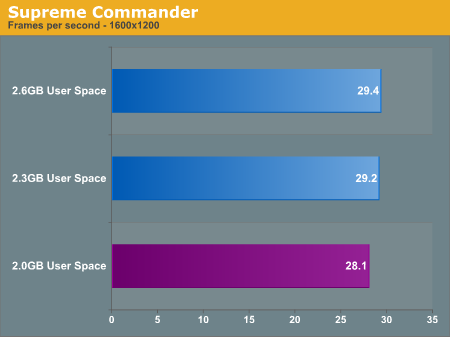
Starting with Supreme Commander, the only test here that can even utilize more than 2GB of user space, we do find a minor but consistent variation in performance. Increasing the user space improved Supreme Commander performance by about 1 frame per second, which at around a 3.5% performance improvement is right along the edge of either being significant or a normal variation. We repeated this test several times just to make sure that it wasn't a variation and the results remained consistent, so it doesn't appear to be a variation. With that said the instability caused by adjusting the user space size does not justify the extremely minor performance improvement.
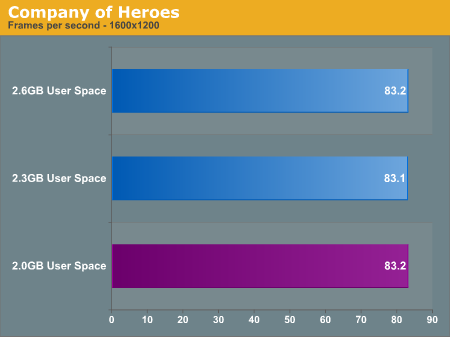
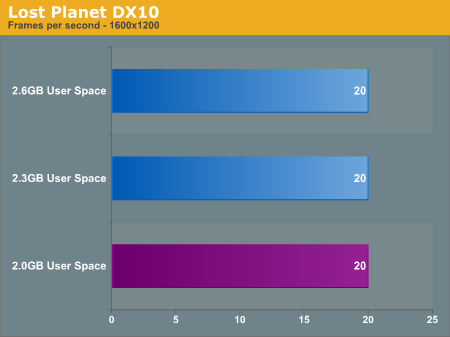
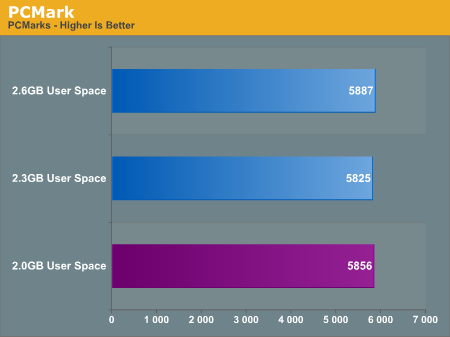
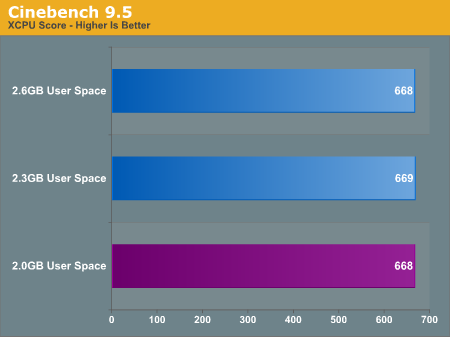
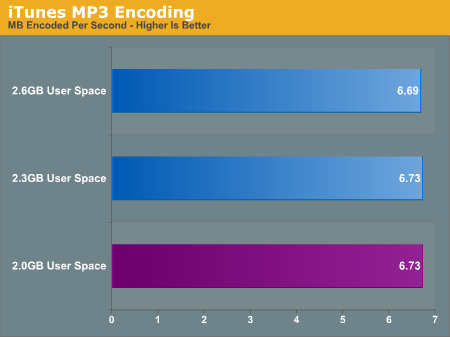
Going down the list of benchmarks, we find that there is no notable change in performance in any of our benchmarks. Since none of these benchmarks are capable of using more user space we weren't expecting an increase, but this puts to rest the idea of a performance decrease. There does not appear to be a performance decrease in adjusting the user space size; if it boots it'll perform well.










69 Comments
View All Comments
johnsonx - Saturday, July 14, 2007 - link
We are both right. While many 32-bit apps run fine on 64-bit windows, some don't. In particular, any app that employs any sort of driver (I'm talking software drivers, not hardware drivers) must at least have the driver compiled in 64-bit mode. In my case the example is a file synchronizing application that installs a driver to monitor file system changes. There are many apps that wouldn't appear to need a driver, but in fact they do. If you want to see the software drivers on your system, go into Device Manager and select Tools->Show Hidden Devices. Now look in "Non-Plug and Play Drivers". Everything in there is a software driver. If you're running 64-bit Windows, everything in there MUST be 64-bit. Applications can also install drivers at runtime, which also must be 64-bit.There are other 32-bit apps that for whatever reason just won't work on 64-bit windows. I believe AutoCAD 2006 and earlier have this problem. Likewise, any apparently 32-bit app that still has some 16-bit legacy code won't run either (for example some rather old but still perfectly useful 32-bit apps use a 16-bit version of InstallShield; the app itself might run, but there's no way to get it installed.).
Regarding the Retail version, I've never had a retail version of Vista in my hand. I recall Microsoft saying at one point that both versions would be on the same disc and had never heard anything contrary.
Christopher1 - Sunday, July 15, 2007 - link
So this 64-bit software driver problem doesn't apply to things like games, I would assume, considering that they usually do not install software drivers?Well then, I think I'm going to contact Toshiba and use their 'Upgrade to x64 version of your operating system' option that recently appeared, if this doesn't effect games.
miahallen - Sunday, July 15, 2007 - link
No, all games should run fine on x64...however, tests have shown that most games run slightly faster on Vista x86.miahallen - Saturday, July 14, 2007 - link
OK you are right, I stand corrected. I knew about this, just wasn't thinking about it. But from my experiance, those particular apps (that use SW drivers) seem to be the ones getting the quickest attention. I do recall having a couple issues related....a freeware plugin for MCE called mymovies. x64 is not supported at all. Also, Daemon Tools & PowerISO were having issues...but I believe they have both been resolved since then (I went to x86 about four months ago, not much point for me to go back until my next upgrade - 8GB RAM).strikeback03 - Friday, July 13, 2007 - link
Somehow I'm doubting that the "average computer user" who buys a prebuilt system without knowing or caring about OS design will stand for random peripherals not working due to a 64bit OS. Probably part of why finding 64bit versions of Vista on prebuilt systems is hard. What should happen is Microsoft state right now that the next version of Windows will be 64bit only; then try and educate consumers that some things won't be compatible, and notify companies that they really need to have their 64bit drivers working by then.jay401 - Thursday, July 12, 2007 - link
No, they should have rendered their units properly (if that's even the real reason... somewhere though they aren't doing something right in their coding, given the way SupCom eats memory).jpeyton - Thursday, July 12, 2007 - link
On page 5, under Software Test Bed, the RAM should read (4x512MB) instead of (4x512GB).fic2 - Thursday, July 12, 2007 - link
First sentence on the front page summary:"As applications being to approach"
I assume that "being" is supposed to be begin.